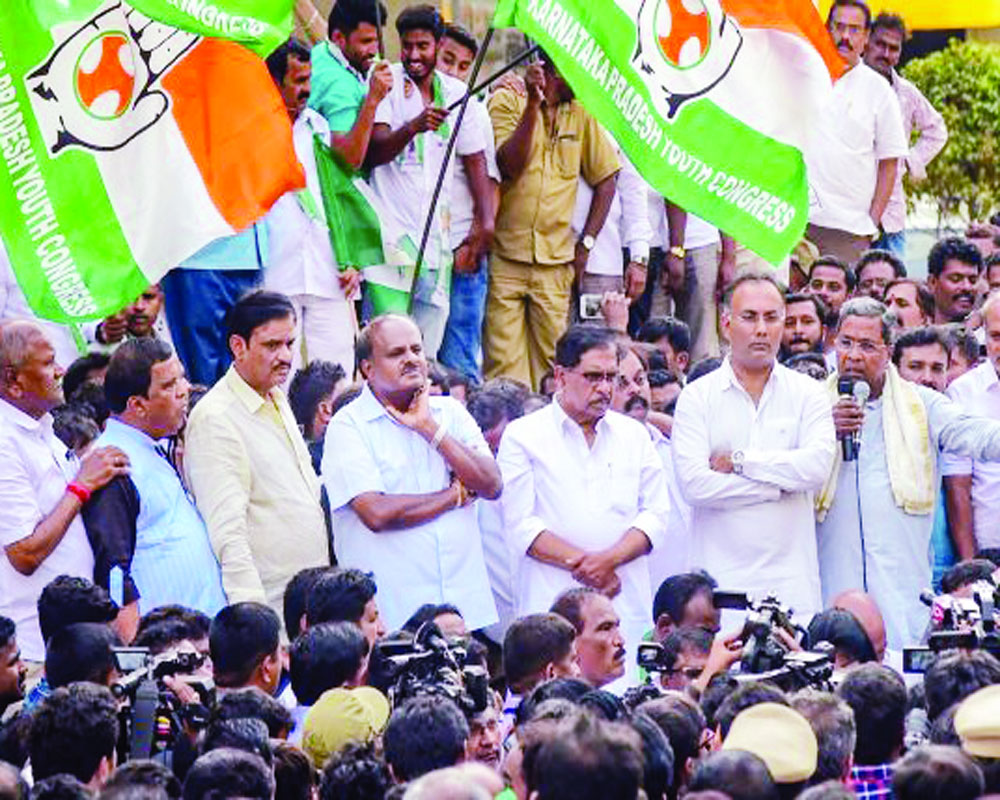History suggests that in most cases, such experiments have not been successful. A common bond and not greed for power should be the motto for two political parties coming together
Coalition Governments generally do not succeed in India. Why is it so? For multiple reasons, perhaps — both at the State and federal level. This has historically been proved not once or twice but numerous times. The latest in series is the ruling Congress-Janata Dal (Secular) coalition in Karnataka. The HD Kumaraswamy-led Karnataka Government is crumbling and this isn’t surprising. The culture of ‘Aya Ram, Gaya Ram’ continues despite stringent anti-defection laws in place. Horse-trading, too, continues unabashedly. Legislators are taken to resorts and are kept in camps.
Ever since the formation of the Karanataka Government a year ago, the Congress-JD(S) coalition was on a shaky ground although the entire Opposition graced the occasion of Kumaraswamy’s swearing-in ceremony. Many believed that a beginning of sorts was made in forging Opposition unity against the BJP juggernaut but ultimately, it remained divided.
One of the reasons for the failure of the Karnataka experiment was because local leaders — of both the Congress and JD(S) — were at loggerheads. Former Chief Minister Siddaramaiah has been sulking, for his bête noire, Kumaraswamy, got the top post. Second, there were allegations that the BJP resorted to ‘poaching’ the legislators. Third, the unnatural character of the coalition, where a major party, the Congress, supported a minor party, JD(S), was not conducive.
In the past one year, many times, news emerged from Bengaluru that the Karnataka Government was shaky. So, the collapse was expected sooner or later for obvious reasons. This brings us to the larger issue as to why coalitions do not succeed. They collapse because of their inherent contradictions. Both the national parties — the Congress and the BJP — too, have not succeeded in coalition experiments earlier. While the Congress played the game of supporting the coalition and pulling out at will, the BJP, too, has experimented with coalition Governments at some point or the other.
Coalition Governments were formed at the federal level in 1989, 1990, 1996, 1997, 1998, 1999 and 2004-2009 by several political parties. The first coalition Government, which completed its full-term, was the Atal Bihari Vajpayee-led NDA-I that remained in power for six years because the BJP provided the spine. The UPA remained in power for a decade for a different reason as it allowed coalition partners to make money from their Ministries.
When anti-Indira forces came together to throw the Indira Gandhi Government in 1977, they could co- exist despite a massive majority just for three years. The VP Singh Government, which was supported in an unusual manner by the Left and the Right in 1989, collapsed within months. The two United Front Governments propped up by the Congress from outside also collapsed within two years.
At the State level, the first coalition experiment was the Samyukta Vidhayak Dal in 1967. The Jana Sangh was a partner. The BJP-BSP Government collapsed within four months in 1995 due to inherent contradictions. The BJP-BSP coalition Government in 1997 and 2002 also did not last long. In Karnataka, the BJP-JD(S) coalition was formed in 2006 but that, too, did not last long.
The BJP-PDP coalition Government in Jammu & Kashmir lasted for just three years — from 2015 to 2018. It was the BJP, which pulled out of the coalition. There was a clear divide between the Valley, where the Peoples Democratic Party (PDP) was strong and the Jammu region, where the BJP won many seats. Ultimately, the BJP felt there was no point in continuing the experiment and quit the Government in June 2018 after three years. The United Democratic Front (UDF) in Kerala is holding primarily because it is a coalition led by two minority interests — Muslims and Christians.
Why then do coalition Governments fail? Often, they are not stable because of a lack of a common minimum programme, as suggested by the Second Administrative Commission. Second, defections are encouraged where the role of the Governor is important. The Sarkaria Commission recommendations should be implemented and the office of the Governor must be made free from political hold. Third, coalition has come to symbolise instability in India because the ruling party has to pander to the needs of the coalition partners. It depends on the competence of the Chief Minister or the Prime Minister to run the coalition. Political parties need to be clear of each other’s expectations and working platform.
A coalition Government at the State or federal level will be stable only when national parties lead it. They will act as a glue and bind them. What is happening is that political parties come together for power and that is the only glue that binds them. There should be a common bond among the partners or else it will be shaky.
(The writer is a senior political commentator and syndicated columnist)


























